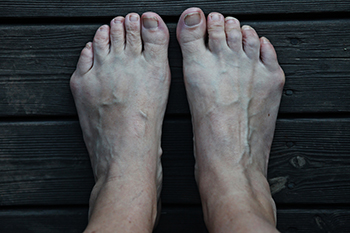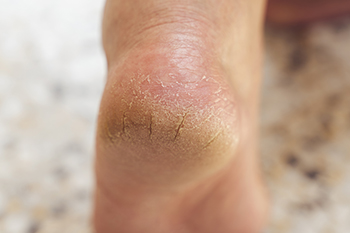
A tailor’s bunion, or bunionette, is a bony prominence that forms at the base of the little toe along the outer edge of the foot. It develops when the bone in this area shifts position or the surrounding tissue becomes irritated over time. Foot structure and genetics often play a role, and wearing narrow or tight shoes can worsen symptoms. People may notice redness, swelling, or a sore spot that rubs against footwear. Discomfort can increase with walking, standing, or wearing stiff shoes. Even mild cases may become painful if pressure continues. Although the bump may appear small, it can interfere with daily activities and shoe comfort. Early care focuses on reducing pressure to help prevent progression and ongoing irritation. Because symptoms can mimic other conditions, proper evaluation matters. If pain, swelling, or shoe irritation along the outer foot persists, it is suggested that you see a podiatrist for a diagnosis and appropriate treatment.
If you are suffering from bunion pain, contact Donovan Gowdie, DPM of The Foot & Ankle Treatment Center. Our doctor can provide the care you need to keep you pain-free and on your feet.
What Is a Bunion?
Bunions are painful bony bumps that usually develop on the inside of the foot at the joint of the big toe. As the deformity increases over time, it may become painful to walk and wear shoes. Women are more likely to exacerbate existing bunions since they often wear tight, narrow shoes that shift their toes together. Bunion pain can be relieved by wearing wider shoes with enough room for the toes.
Causes
- Genetics – some people inherit feet that are more prone to bunion development
- Inflammatory Conditions - rheumatoid arthritis and polio may cause bunion development
Symptoms
- Redness and inflammation
- Pain and tenderness
- Callus or corns on the bump
- Restricted motion in the big toe
In order to diagnose your bunion, your podiatrist may ask about your medical history, symptoms, and general health. Your doctor might also order an x-ray to take a closer look at your feet. Nonsurgical treatment options include orthotics, padding, icing, changes in footwear, and medication. If nonsurgical treatments don’t alleviate your bunion pain, surgery may be necessary.
If you have any questions, please feel free to contact our office located in Watkinsville, GA . We offer the newest diagnostic and treatment technologies for all your foot care needs.

Winter conditions increase the risk of slipping when feet lose traction on icy or wet surfaces, making footwear choices and foot function especially important. Shoes with firm soles, deep tread, and a stable heel help the feet grip the ground and limit ankle rolling, while worn shoes raise the chance of imbalance. Foot shape, reduced sensation in the toes, and stiffness in the ankles can affect balance, especially with age. A podiatrist can evaluate gait, check ankle motion, and identify problems like nerve changes or arthritis that interfere with stability. Treatment can focus on improving foot alignment, managing pain, and addressing deformities that limit safe walking, with surgery considered when structural problems prevent support. If you are at risk for falls, it is suggested that you make an appointment with a podiatrist for a diagnosis and options for prevention.
Preventing falls among the elderly is very important. If you are older and have fallen or fear that you are prone to falling, consult with Donovan Gowdie, DPM from The Foot & Ankle Treatment Center. Our doctor will assess your condition and provide you with quality advice and care.
Every 11 seconds, an elderly American is being treated in an emergency room for a fall related injury. Falls are the leading cause of head and hip injuries for those 65 and older. Due to decreases in strength, balance, senses, and lack of awareness, elderly persons are very susceptible to falling. Thankfully, there are a number of things older persons can do to prevent falls.
How to Prevent Falls
Some effective methods that older persons can do to prevent falls include:
- Enrolling in strength and balance exercise program to increase balance and strength
- Periodically having your sight and hearing checked
- Discuss any medications you have with a doctor to see if it increases the risk of falling
- Clearing the house of falling hazards and installing devices like grab bars and railings
- Utilizing a walker or cane
- Wearing shoes that provide good support and cushioning
- Talking to family members about falling and increasing awareness
Falling can be a traumatic and embarrassing experience for elderly persons; this can make them less willing to leave the house, and less willing to talk to someone about their fears of falling. Doing such things, however, will increase the likelihood of tripping or losing one’s balance. Knowing the causes of falling and how to prevent them is the best way to mitigate the risk of serious injury.
If you have any questions, please feel free to contact our office located in Watkinsville, GA . We offer the newest diagnostic and treatment technologies for all your foot care needs.

Heel pain is a frequent foot concern and can develop from a variety of conditions. The most common cause is plantar fasciitis, which involves irritation of the thick tissue band that runs from the heel to the toes. Other frequent causes include Achilles tendonitis, heel spurs, and repetitive strain from activities such as running or prolonged standing. Symptoms often present as sharp, stabbing, or aching pain that is typically worse with the first steps in the morning or after resting. Stiffness, swelling, or redness may also be present. Diagnosis usually begins with a physical examination and may include imaging studies, such as X-rays or MRI scans, to identify underlying issues. Treatment varies based on the cause and may include supportive footwear, orthotics, stretching exercises, or other targeted therapies. In rare cases, surgical intervention may be considered. If heel pain persists, it is suggested that you make an appointment with a podiatrist for an accurate diagnosis and appropriate care.
Many people suffer from bouts of heel pain. For more information, contact Donovan Gowdie, DPM of The Foot & Ankle Treatment Center. Our doctor can provide the care you need to keep you pain-free and on your feet.
Causes of Heel Pain
Heel pain is often associated with plantar fasciitis. The plantar fascia is a band of tissues that extends along the bottom of the foot. A rip or tear in this ligament can cause inflammation of the tissue.
Achilles tendonitis is another cause of heel pain. Inflammation of the Achilles tendon will cause pain from fractures and muscle tearing. Lack of flexibility is also another symptom.
Heel spurs are another cause of pain. When the tissues of the plantar fascia undergo a great deal of stress, it can lead to ligament separation from the heel bone, causing heel spurs.
Why Might Heel Pain Occur?
- Wearing ill-fitting shoes
- Wearing non-supportive shoes
- Weight change
- Excessive running
Treatments
Heel pain should be treated as soon as possible for immediate results. Keeping your feet in a stress-free environment will help. If you suffer from Achilles tendonitis or plantar fasciitis, applying ice will reduce the swelling. Stretching before an exercise like running will help the muscles. Using all these tips will help make heel pain a condition of the past.
If you have any questions, please feel free to contact our office located in Watkinsville, GA . We offer the newest diagnostic and treatment technologies for all your foot care needs.

Dry, cracked heels develop when the skin loses moisture and becomes less flexible, making it easier for small splits to form. These cracks can feel rough, tender, or irritated, especially when standing for long periods of time or wearing open backed shoes. Some people notice flakes of skin or deep fissures that catch on fabric and make walking uncomfortable. The problem can worsen in dry climates, during colder months, or when the skin is exposed to repeated friction. A podiatrist can evaluate the cause, remove thickened skin safely, and recommend products that restore moisture without irritating sensitive areas. Guidance on footwear and daily habits can also help reduce pressure on the heels and prevent recurrence. If dryness or cracking continues or begins to cause discomfort, it is suggested that you see a podiatrist for effective treatment solutions, which may include prescribed medication.
If the skin on your feet starts to crack, you may want to see a podiatrist to find treatment. If you have any concerns, contact Donovan Gowdie, DPM from The Foot & Ankle Treatment Center. Our doctor can provide the care you need to keep you pain-free and on your feet.
Cracked Heels
It is important to moisturize your cracked heels in order to prevent pain, bleeding, and infection. The reason cracked heels form is because the skin on the foot is too dry to support the immense pressure placed on them. When the foot expands, the dry skin on the foot begins to split.
Ways to Help Heal Them
- Invest in a good foot cream
- Try Using Petroleum Jelly
- Ease up on Soaps
- Drink Plenty of Water
Ways to Prevent Cracked Heels
- Moisturize After Showering
- Skip a Shower
- Keep Shower Water Lukewarm
- Don’t Scrub Your Feet
If you are unsure how to proceed in treating cracked heels, seek guidance from a podiatrist. Your doctor will help you with any questions or information you may need.
If you have any questions, please feel free to contact our office located in Watkinsville, GA . We offer the newest diagnostic and treatment technologies for all your foot care needs.
